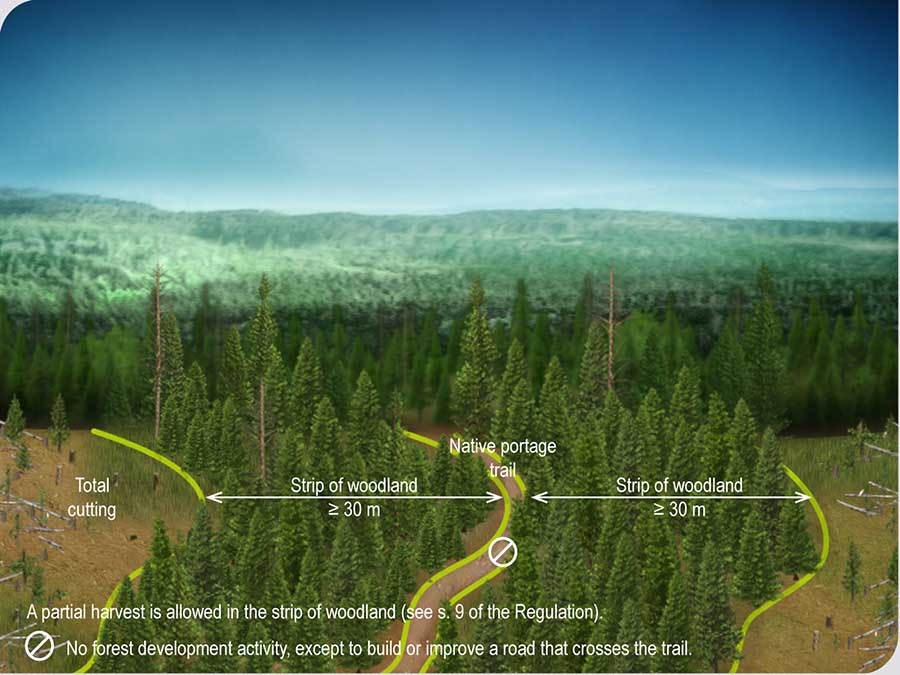Chapter II – Protection of particular places and territories
Division II – Special provisions applicable to Native portage trials, Native campgrounds and Native gathering or sojourn areas
Section 19
No forest development activity may be carried out on a Native portage trail. However, it is allowed to build or improve a road that crosses a Native portage trail.
However, it is allowed to build or improve a road that crosses a Native portage trail.
1
Objective
- To preserve the integrity of a site of particular interest to a Native community
Additional information
It is important to note that the definition of the term “forest development activity” in section 2 of the Regulation means that the standards set out in sections 3, 5, 19 to 22, 47, 50, 52, 54, 55, 57 and 59 do not apply to the repair, maintenance or closure of forest roads or to the control of fires, insect epidemics and cryptogamic diseases.
Figure 19 Strip of woodland on either side of a Native portage trail
2
Objective
- To reconcile the various activities that take place in the forest
A strip of woodland at least 30 m wide must be preserved on each side of Native portage trails so as to create a visual setting and to maintain the forest ambiance of the site. 
3
Objectives
- To preserve the integrity of a site of particular interest to a Native community
- To contribute to the quality of the experience in the forest
Figure 19 Strip of woodland on either side of a Native portage trail
The provisions of section 9 respecting partial cutting applies to that strip of woodland kept on each side of Native portage trails. 
4
Objectives
- To allow for the harvesting of wood
- To ensure the renewal of trees in the strip of woodland
Explanations
The provisions of section 9 respecting partial cutting are as follows:
The permitted intensity of harvesting in the strip of woodland kept on either side of a Native portage trail varies by stand type.
In the case of a stand composed of the species referred to in Part A of Schedule 2, up to 40% of the merchantable stems may be harvested, provided the density of the stand is not reduced to less than 700 merchantable stands/ha. In the case of a stand composed of species referred to in Part B of that Schedule, up to 40% of the basal area may be harvested, provided the density of the stand is not reduced to less than 16 m²/ha.
However, where partial cutting takes place in the stand adjacent to the strip of woodland kept on either side of a Native portage trail, the harvest level in the strip of woodland must comply with the specifications set out in the sylvicultural prescription of the adjacent stand.
This section does not apply to the holder of a forestry permit issued for forest development activities carried out by the holder of mining rights to exercise those rights, unless the mining activities are to extract surface mineral substances.
5
Objective
- To allow certain forest development activities in or near a particular place
Explanations
A holder of mining rights who also holds a forestry permit may carry out forest development activities on and around a Native portage trail, unless the mining activities are to extract surface mineral substances.
The Minister responsible for applying the Sustainable Forest Development Act  may, when giving authorization, specify the forest development activities that are authorized in the forestry permit and set the conditions that must be met when carrying them out.
may, when giving authorization, specify the forest development activities that are authorized in the forestry permit and set the conditions that must be met when carrying them out.
Additional information
The Sustainable Forest Development Act ![]() states that a forestry permit is required to carry out certain forest development activities in forests in the domain of the State (section 73
states that a forestry permit is required to carry out certain forest development activities in forests in the domain of the State (section 73 ![]() ). The Act allows the Minister to issue a permit authorizing the holder to carry out the forest development activities specified on the permit, on the conditions determined by the Minister (section 74
). The Act allows the Minister to issue a permit authorizing the holder to carry out the forest development activities specified on the permit, on the conditions determined by the Minister (section 74 ![]() ).
).

